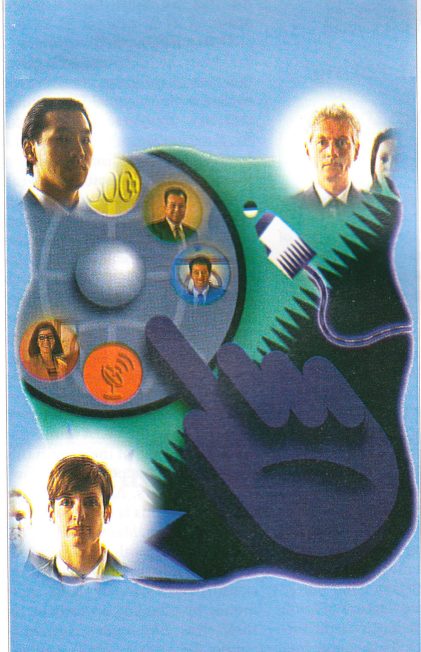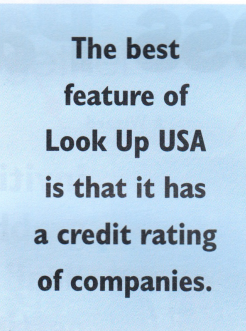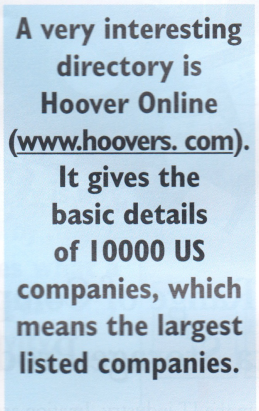A Wizard
Inviting options grabbing the ‘best deal’ on the web and getting that ‘business deal’ off ground

Just yesterday, I received a call from one of my business associates. She is an exporter of marine products including tuna, prawns and cuttle fish. She wanted to know how she could expand her business which is going through a bad phase now because of stringent restrictions from the US and Europe. Her desire was to find potential buyers abroad. She has one more problem. She doesn’t want to spend too much money on searching for the potential partners.
One of the best solutions to her problem was the Trade Compass site (http://www.tradecompass.com). This is ideal for finding potential importers in the US. However, the cost of access, US$150 (Rs 8250) for unlimited access for a month, seems to have put off people. There is a way of getting around the cost as required by my business associate. It is not an optimum solution but since the only expense is the cost of a couple of hours on the internet, many readers might find it worth a try.
The site to be accessed is still Trade Compass, but the feature to use is the ‘demo access’ module under Trade Smart. Although the site looks as if it is not accessible to shell account holders, this is not true. When the ‘demo access’ icon is hit, you will be given two options: formframe or table. Choose the formframe option. You will next be taken to a form to be filled up. Enter the name of the commodity, say, ‘marine products’. Leave everything else blank. The search you want it to carry out is of ‘Buyer Details’, not ‘Buyer Summary’. You will then be asked to choose between wanting to see the results of your query on-screen or via e-mail. Choose the e-mail option. Also enter your e-mail address, so that Trade Smart can send you the answer to your query by e-mail.
If you’ve done everything right, within about five minutes you will get an e-mail giving you a list of all US importers of marine products during the period between January 1, 1997 and January 15, 1997. Don’t rejoice yet. First, the search that Trade Compass does is not very accurate. For instance, if you have put ‘marine products’ as the commodity, the search result will contain the names of importers of octopus, tuna, several other marine products you haven’t heard of including other than fish such as shipping, marine engines, etc. Sometimes it would even give you the list of all importers other than those of marine-produce. (This is why I suggested earlier that you should ask the software to search for ‘Buyer Details’ not ‘Buyer Summary’. With the latter you tend to get the impression that all the companies mentioned are actually importers of marine produce).
The fact that your search did not yield a single importer of marine produce does not, of course, mean that no company in the US imports marine products. It merely means that no US company imported marine produce inthe period for which the demo access answers queries. In that case, there is no option but to shell out US$8150 and do a full-fledged search.
The second problem is that many of the companies listed as importers are not actual importers but bankers to the importers. Writing to a bank asking whether it wants to import marine products is not likely to be very fruitful. The

third problem is to verify the antecedents of the importers. Experts suggest a good way. That of buying reports from Dun & Bradstreet. But an even cheaper way is to access the database of a directory called Look Up USA (http://www.abii.com) which lists 11 million companies.
How good is Look Up USA? The company claims that it searches yellow pages, annual reports and Securities & Exchange Commission reports, federal, state and municipal government data to choose companies for the data base. After that its 330-strong staff actually call all 11 million businesses every year (and more often for larger companies) to weed out companies that have gone out of business. The best feature of Look Up USA is that it has a credit rating of companies. This comes free (remember that you have to pay for it on Dun & Bradstreet). However, the rating is not done using an actual study of companies’ payment history, and so is obviously not as good as Dun & Bradstreet’s.
But searching through Look Up USA at least ensures that the importers you narrow down on through Trade Smart are actually at the addresses mentioned. When I did a sample search I found that more than half the addresses located through Trade Smart did not exist on Look Up USA or any other directory. So potential exporters can use Look Up USA to eliminate many companies before beginning to try and contact them. Be warned that both Trade Smart and Look Up USA are very busy sites. If they say that your query cannot be processed at the moment, wait for half an hour before trying again.
Other Business Directories
One is Thomas Register (www.thomasregister.com) and the second is the Financial Times Information Database (www.info. FT.com/companies), apart from the Look Up USA just discussed. Apart from permitting you to search through their business directories, these sites also have a wealth of other features for which a subscription fee is charged. I shall now introduce you to a web site which features the addresses and a brief summary of at least a couple of score directories. The site is (www.dis.strath.ac.uk/business) and is maintained by Sheila Webber of the Department of Information Science at the University of Strathclyde in the UK. A warning at the outset: many of the sites in this listing are not accessible to shell account holders. Although it may seem unfair, this is quite a reasonable restriction. Many of the directories are free both to surfers and to companies which are listed on them. They obviously make their money by charging advertisers on their sites. Since advertisements cannot be seen by shell account users, it makes eminent sense to keep them out.
Webber has divided her list of directories into two parts. The first lists directories of US, Canadian and British companies. The second lists directories elsewhere in the world. This column can do no more than skim through a selection of directories.
In the UK Electronic Yellow Pages (www.eyp.co.uk), the electronic version of British Telecom’s Yellow Pages directory, lists contact details of 1.6 million UK businesses. It is searchable by location or category, plus company name. You can access any category including marine product importers quite easily. In Business (www. inbusiness.co.uk) is a directory of 2 million UK firms, produced by Thomson Directories. Details are checked and verified on an average 12-18 months. If In Business cannot contact anyone at the listed business number, the entry is removed. Kompass British Exports Interactive (www.british exports.reedinfo.co.uk) lists 90000 UK exporters by name, product, number of employees, and so on along with contact details. Besides this Webber’s site also lists a number of local directories in Scotland, Northern Ireland, and even small counties.
As may be expected from a country that is in the forefront of the Internet revolution, the US has a large number of directories. Among these are Big Book (www.bigbook.com) which lists 11 million US businesses and even includes maps giving the location of many companies, some upto street level. Big Yellow Pages (www.bigyellow.com), which is essentially the electronic version of Nynex’s yellow page directories, lists as many as 16 million businesses. Companies online (www. companiesonline.com) is a searchable directory of 7500 US companies compiled by Dun &

Bradstreet in association with Lycos, a search engine company. A very interesting directory is Hoover Online (www.hoovers. com). It gives the basic details of 10000 US companies, which means the largest listed companies. Apart from financial details and so on, this list also links up to 5000 corporate web sites. So, if you do not have the web site address of any company, it would be a good idea to first go to Hoover Online, search for the company and then move to its own corporate web site.
In the second list, Webber gives details of other directories in other parts of the world. One of the best, though not in terms of number of companies, is the Financial Times Information Database (www.info. FT.com/companies). Then there is an Australasian site (asiabiz.com). This has pages of links to web sites in specific sectors or countries. Most useful are a comprehensive set of links to other Asian Internet directories. Other countries with directories mentioned include Austria, Belgium, the Czech Republic, Denmark, Finland, France, Germany Hungary, Iceland, Italy, Ireland, Mexico, the Netherlands, Poland, Portugal, South Africa, Spain, Sweden, Switzerland, Taiwan, and Thailand. The trouble with some of these directories is that they are not in English.
I think I have listed enough low-cost options to find potential business partners all over the world. This should satisfy not just my marine products exporter, but anybody who wants to do regular business with people abroad. Even a collaboration and partnership!


